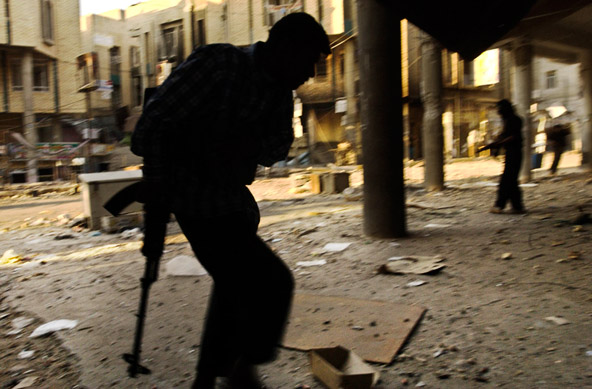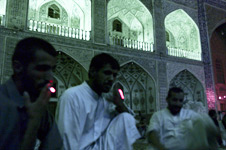
Najaf, Iraq, 27 August 2004. A member of the Mahdi Army runs for cover during a firefight with the Iraqi police, shortly following a ceasefire agreement which allowed religious pilgrims back into the city.
Photo: Thorne Anderson, Corbis.
By late July 2004, the uprisings had spread across Iraq, pulling in villages and major cities into open warfare, and the U.S. was calling in air strikes and heavy armor until we had the feeling that the whole thing was going to end in an apocalypse, a great shout of blood and heat. The road south of Baghdad had rolled all the way out until it was the country itself.
While we drive to Baghdad, twenty miles away, Moqtada al Sadr wears a white martyr's shroud and prepares to speak to thousands of his followers in the courtyard of the vast Kufa mosque. It marks the place where Imam Ali, the first Shiite saint, was murdered. Moqtada's father, Mohammed Sadiq al Sadr, gave sermons at this mosque until he was assassinated by security agents working for Saddam. Moqtada is the son of a martyr and the shroud symbolizes his willingness to follow his father into death. On the grounds of the mosque there is no space to move, the courtyard is full of worshippers and perhaps ten thousand men cover the marble stones like a sea. They wait until a shattering sound comes from speakers in the minarets, the name of God in a hundred rising and falling notes. Its carrier wave is the breaking voice of a young man, one of the Mahdi revolutionaries. When the militiamen hear him, they stand absolutely still with their hands at their side, the differences between the men etched away by the name of God. The muezzin's call holds them outside time until the voice they hear ceases to emanate from the singer, it belongs now to the myriad men in black shirts and sandals who no longer want to live in the corrupt world. The voice kills and resurrects. Hearing the call is like having electrical wires run through your veins. It sounds like heartbreak. They pray and touch their heads to the ground and rise again.
After the call, al Sadr begins to speak. The cleric promises he will never leave his followers, that he is prepared to die for them. "I will never abandon you no matter what, and I am close to you and living the same life as you." Al Sadr in his unrefined Arabic urges them forward into the guns of the Americans with the following chain of associations: I am like Imam Ali, the first martyr of the Shiites, and I am prepared to die. If you follow me, then you must also be prepared for death. In order to be a saint, you must die.
Death is the only way to free yourself from the corruption of the world. "There is no stench in paradise," a fighter told me when I asked what he thought death was like. "Things don't rot like they do here." In the mosque, the crowd of men in their black shirts under the crucible sun stands hypnotized by the savior. It's a hundred and fifteen degrees, and the waves of sound from the public address system are breaking on the high walls of the mosque. Al Sadr tells them that the war against the Americans is going to begin and he wants them to be ready.
The men believe al Sadr is the disappeared twelfth Imam, returning to deliver them from evil and injustice at the end of the world. "He is just like a lion. He is the Lion of God." One Mahdi Army fighter once said to me during one of these faith rallies, his eyes ecstatic. They were all thinking the exact same thing, it didn't really matter who you asked. Soon, they would hallucinate. In the Kufa mosque, thousands of young men are kneeling in rows behind al Sadr and pray while other identical men standing on the walls of the Kufa mosque scan the dead horizon with rifle scopes. Many of the older fighters rose up against Saddam after the gulf war. When you met them in their homes, the first thing they showed you were the pictures they took in Abu Ghraib.
The ceasefire that has lasted for nearly a month is on the verge of collapse. The war will start in a matter of days now, but we don't know it yet. There's feeling of dread. U.S. forces have demanded that Mahdi Army forces withdraw from Najaf and Kufa, while the Mahdi Army demands that the U.S. withdraw from Iraq. Ayatollah Sistani and the old sheikhs of the surrounding towns said that they want the Mahdi Army to withdraw. Moqtada al Sadr publicly refused, saying he will only follow the directions of the highest religious authorities. It's a strange statement to make. Sistani is the highest Shiite authority and he is being ignored. The present uprising led by Moqtada al Sadr grew out of Shiite congregations all over the country but is fueled by young men who have nothing. Just before the uprisings started, Pro-Mahdi Army imams urged Iraqis to join the movement, to travel to Najaf and take a stand to defend their religion. Thousands obeyed.
The Well
In the evening, hordes of bats flew down from the tops of the buildings to drink from the Hamra pool. The bats, falling and wheeling through the soft air, nicked the glassy surface of the water and then returned in a single arc to the tops of the buildings where they lived. Every night I watched their trajectories, amazed. The pool was the one place everyone went. It attracted and repelled. It was beautiful when the power went out. When the city power failed everything went black except the pool radiating its silent blue reactor light.
South African mercenaries ended up there and every time a mortar round went overhead they would take defensive positions in the halls crouching in corners. Some of these men were enormously fat and wore the gregarious faces of Down's Syndrome victims. The older mercenaries had spent serious time in Angola and the rifles in their giant meaty hands were like miniature theater props, useless. They smiled like children. It was surprising that a mortar never hit the pool. I wished for one in a perverse way, anything that would shut down the fucked up conversation.
 LEAD IMAGE: 17 August, 2004, Najaf, Iraq. Young followers of Moqtada al Sadr inside the shrine of Imam Ali during the siege.
LEAD IMAGE: 17 August, 2004, Najaf, Iraq. Young followers of Moqtada al Sadr inside the shrine of Imam Ali during the siege.Photo: Thorne Anderson
© Phillip Robertson, 2009-2020.
